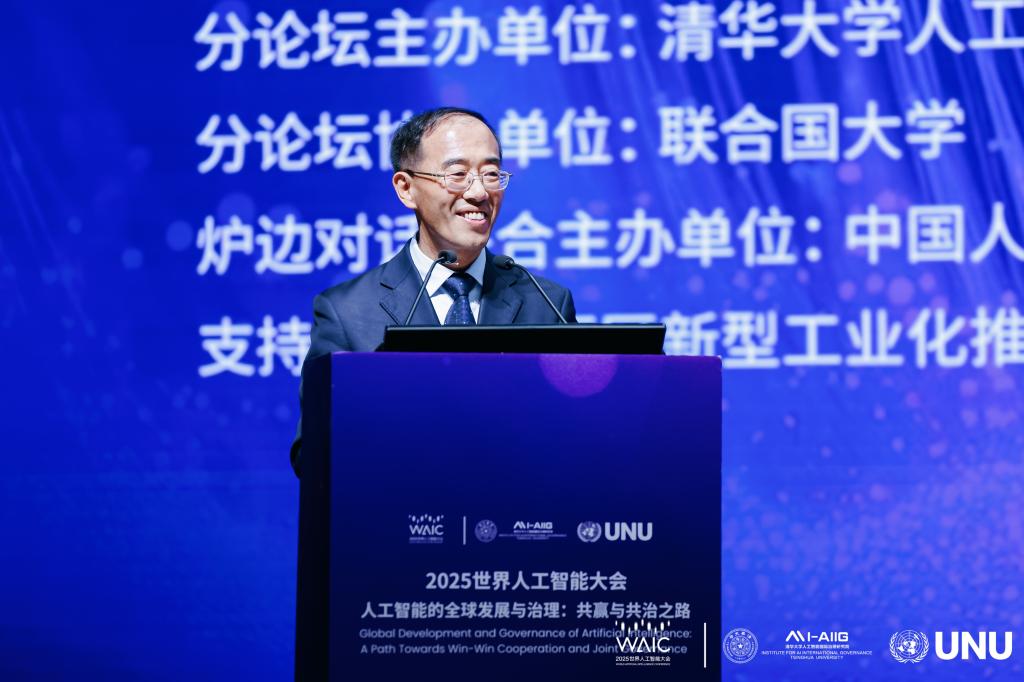On the afternoon of July 27, 2025, the forum on “Global Development and Governance of Artificial Intelligence: A Path Towards Win-Win Cooperation and Joint Governance” was grandly held at Alibaba’s Xuhui Riverside district in Shanghai as part of the 2025 World Artificial Intelligence Conference (WAIC 2025). The event brought together global experts to explore AI governance frameworks, promoting equitable sharing of technological benefits and responding to transnational governance needs to foster an open, inclusive, equitable, and benevolent AI development.
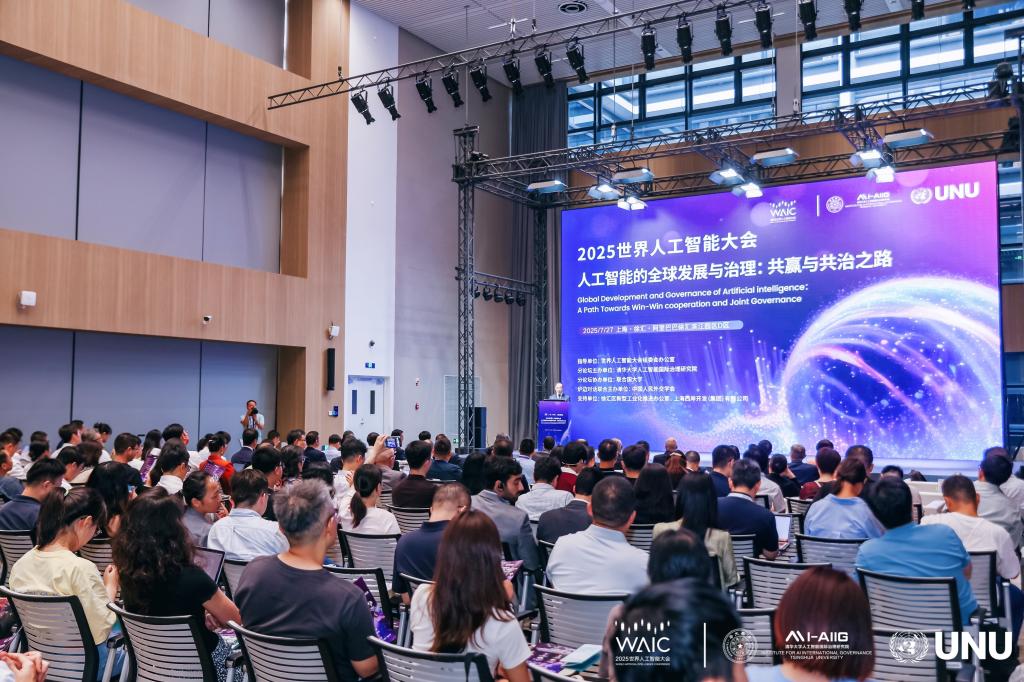
Distinguished guests attending the forum included Li Meng, President of the Chinese Society for Sustainable Development and former Vice Minister of the Ministry of Science and Technology of China; Zou Xiaoli, Vice President of the Chinese People’s Institute of Foreign Affairs (CPIFA); Tshilidzi Marwala, Rector of the United Nations University (UNU) and Under-Secretary-General of the UN; Cui Tiankai, former Chinese Ambassador to the United States and Advisor to CPIFA; Craig Mundie, former Chief Research and Strategy Officer of Microsoft; and Li Huidi, Vice President and Chief Cybersecurity Officer of China Mobile Communications Group Co., Ltd. The forum was moderated by Liang Zheng, Vice Dean of the Institute for AI International Governance (I-AIIG) at Tsinghua University.
The forum agenda included an opening ceremony, report release, frontier sharing, fireside dialogue, book launch, competition kick-off, and roundtable discussions.
Opening Remarks
Li Meng emphasized the critical juncture of AI development and governance at present. “China has always attached great importance to effective governance, sustainable development, and international cooperation regarding AI,” she remarked. “We focus on both the technological and social attributes of AI, integrating theoretical research, technological innovation, industrial development, and social oversight. We have formed a comprehensive governance mechanism, advocating synchrony between our guiding principles and regulatory constraints, with positive feedback at the foundational level.”
Concerning AI’s inherent risks, Li stressed the importance of ensuring AI models are “innately good,” strengthening developer education and supervision, and tailoring governance to specific industry characteristics. “Ultimately, we must embrace the vision of human and AI co-growth and learn to adapt mutually, in order for AI to benefit all levels of society,” she concluded.
Zou Xiaoli highlighted the forum’s theme, stating, “The concepts of ‘win-win cooperation’ and ‘co-governance’ align with two core questions in AI governance: What does this path mean? And how do we navigate it?” She underscored China’s proactive approach to a global AI governance framework based on consultation, contribution, and shared benefits. “Global cooperation is the only correct choice for humanity’s shared future,” Zou stressed. “Cooperation between China and the US is the mutually beneficial path; working in opposition leads nowhere. CPIFA is ready to organize more expert dialogues to promote healthy, safe, and orderly AI development.”
Video Address from UNU
Tshilidzi Marwala heralded WAIC as a beacon leading the future of AI. He highlighted the strengthened partnership between UNU and Tsinghua’s I-AIIG, marked by a newly signed memorandum of understanding that lays the foundation for a United Nations AI Center.
“AI development and governance face critical challenges and opportunities,” Marwala stated. “International cooperation, transparency, and responsible development are vital.” He announced the launch of the “AI for SDGs - 2025 Global Youth AI Future Innovation Competition,” encouraging young innovators worldwide to drive AI solutions for environmental protection, climate change, and related global issues.
Marwala concluded with a call for global unity to ensure sustainable AI development that benefits all humanity.
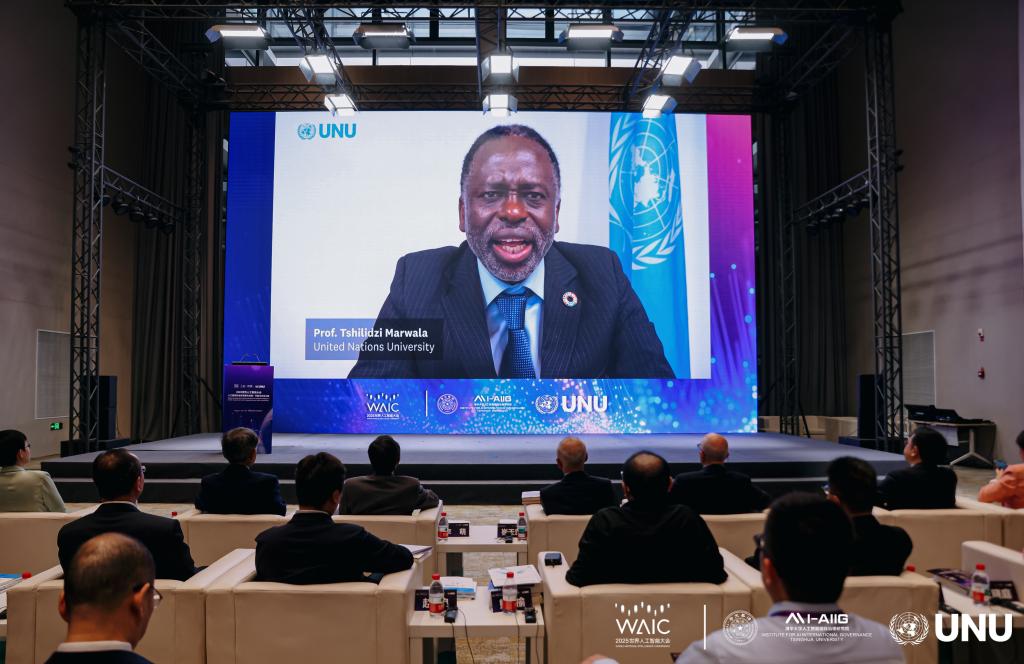
Report Release
Xue Lan, Cheung Kong Chair Distinguished Professor and Dean of I-AIIG at Tsinghua University, unveiled the research report From Consensus to Action: Building an Inclusive and Equitable Global AI Governance Framework. Key recommendations in the report include embedding human-centered values in AI governance, with a focus on development, security, and fairness. However, implementation still faces challenges such as fragile consensus, weak enforcement, and uneven execution.
The report reviews recent global progress, highlighting a shift from theoretical exploration to pragmatic action. In addition to integrating “human-centered” values in AI, establishing agile governance frameworks, creating security zones for cooperation among major countries, and building more inclusive international networks are top priorities. These steps aim to strengthen global AI governance capabilities and ensure AI benefits all humankind by serving human welfare.
Frontier Sharing
Li Huidi, Vice President and Chief Cybersecurity Officer at China Mobile Communications Group Co., Ltd., shared insights in her keynote speech, “Building Intelligent Cloud-Network Synergies for a Shared Digital-Intelligence Future, Promoting ‘AI for Good’ to Address Global Challenges.”
She noted that AI-driven intelligence, computing power, and data are driving new levels of productivity. Generative AI delivers technological breakthroughs that transform industries and promote inclusive digital equity, but it also introduces poor-quality training data, deepfakes, isolated governance, and uneven resource distribution.
“China Mobile insists on ‘AI for Good,’” Li emphasised, citing the company’s principles of consultation, joint construction, and shared benefits. She mentioned China Mobile’s efforts to advance its infrastructure, foster inclusive information services, and build a robust AI security governance system.
Li additionally proposed the “Four Commons” system for sustainable AI development: common digital infrastructure, inclusive intelligent services, ethical AI ecosystems, and collaborative governance mechanisms to bridge data, computing, and intelligence gaps.
Fireside Dialogue
Moderated by Xue Lan, the dialogue featured Craig Mundie, former Chief Research and Strategy Officer of Microsoft, and Cui Tiankai, former Chinese Ambassador to the United States.
Mundie recalled that informal China-US AI dialogues began shortly after Henry Kissinger first met with Chinese leaders. He described AI’s profound systemic impacts, reshaping human cognition, organization, and even the relationship between humans and intelligent systems.
“We are at the initial stages of AI development, gradually shifting from rudimentary usage to eventual coexistence and co-evolution,” Mundie believes. He commented that AI might progress from a human-controlled tool to an intelligent partner, and urged stable cooperative frameworks between China and the US to reduce misunderstandings and guide AI development for human benefit.
Cui Tiankai stressed that rapid AI progress presents unprecedented ethical, social, and political hurdles. He advised responsible communication and coordination among nations to address these challenges. “While differences in systems and interests exist,” Cui said, “China and the US should adopt a global perspective by avoiding a zero-sum mindset and jointly building a fair, sustainable, and progressive governance system.”
They agreed that global AI governance requires inclusiveness, cooperation, and multilateral dialogue. As leading AI powers, China and the US both have a responsibility to modernize policies and institutions, showing that healthy competition can coexist alongside shared governance and mutual benefit.

Book Launch Ceremony
Vice Dean Xiao Qian hosted the release of the Major AI Application Scenarios series, led by Tao Haiqing (Zhijiang Intelligence), Liu Lihui (China Development Press), and Sun Yutao (Dalian University of Technology). These four volumes cover AI applications in finance, government services and social governance, education, and automotive sectors, forecasting industry trends empowered by technology.
The launch ceremony was witnessed by Zhao Liang, Secretary of the Party Committee at China Investment & Financing Guarantee Co., Ltd.; Zhao Gang, General Manager at China Mobile Communications Group Co., Ltd.; Yan Lili, Secretary of the Party Committee at China Telecom Research Institute; Zhou Zhifeng, Senior Vice President and General Counsel at Ant Group; and He Tao, Director at Baidu Development Research Center.
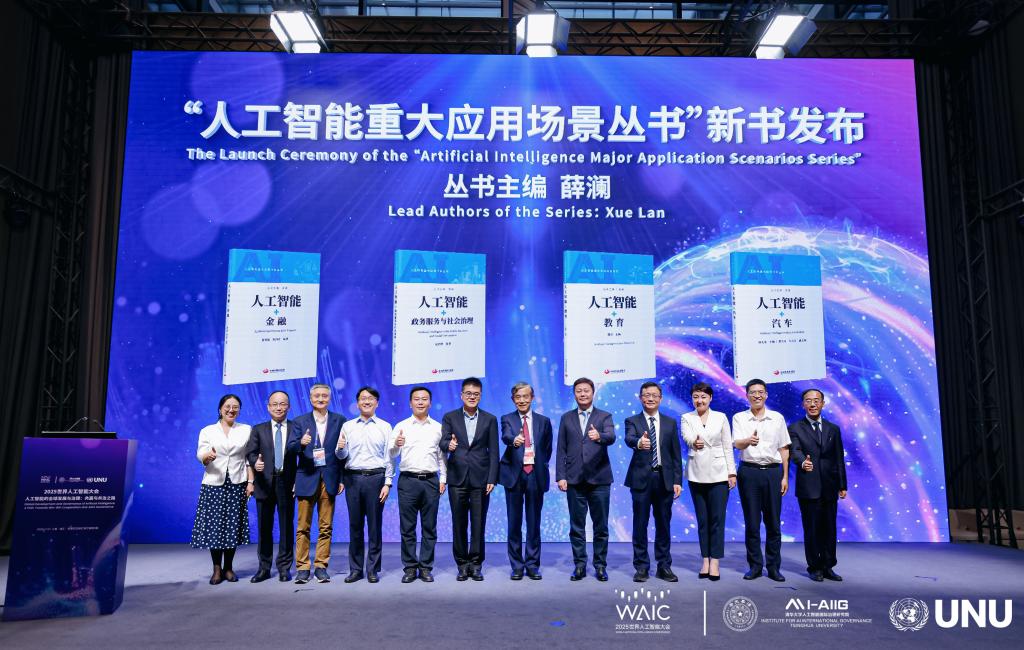
Global Youth AI Future Innovation Competition 2025 Kick-off
Huang Jingbo, Director of the United Nations University Institute in Macau, moderated the kick-off. Wu Jie, Executive Director of Venture Cup China, introduced the event’s structure and goals.
The competition focuses on “Ecological Environment and Green Transition Challenges” across four tracks: Climate Change Adaptation, Environmental Protection and Conservation, Clean Energy, and AI for Less Developed Countries. It encourages youth to develop forward-looking, practical, and impactful AI solutions addressing issues such as extreme weather forecasting, smart agriculture, ecological protection, intelligent grids, energy materials research, circular economy, and smart manufacturing.
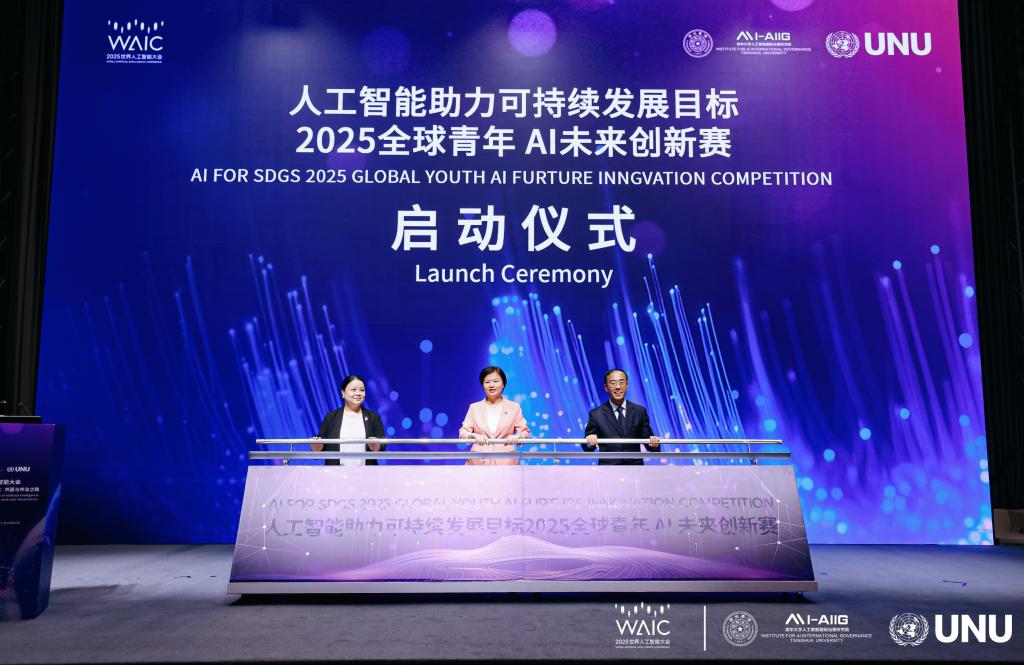
Roundtable Discussion
Moderator Xiong Yu, Associate Vice President at the University of Surrey, led a dialogue alongside Huang Jingbo; Datuk Nicole Wong, Special Officer to the Malaysian Deputy Prime Minister; Zhou Zhifeng (Ant Group); Cyrus Hodes, Co-Founder of Stability AI and 1infinity Ventures; and John Higgins CBE, Chair of the International AI Governance Association.
The panel addressed core AI governance challenges, discussing how to balance innovation with risk management and collaborate on feasible global governance architectures.
Datuk Nicole Wong identified a lack of inclusiveness as a key gap in AI governance. She highlighted cross-border risks such as deepfakes, AI scams, and attacks on critical infrastructure, contrasting with uneven regulations and fragmented standards worldwide. She noted Malaysia’s efforts in promoting AI development aligned with ethics, inclusiveness, and reciprocity, seeking regional cooperation with the country’s ASEAN partners.
Zhou Zhifeng emphasized corporate responsibility in the fragmented global governance landscape. “AI and AGI are fundamentally transforming social operations,” he remarked. He called for consensus-building and collaborative efforts among governments, industry, academia, and consumers to build governance as reusable public infrastructure, enabling sustainable innovation.
Cyrus Hodes noted that general intelligence is on the horizon and may soon surpass human cognition, making AI governance the most prescient matter of modern times. He praised China for addressing this challenge and stressed the need for open ecosystems where stakeholders share risks and quickly iterate rules. “AI governance is a serious long-term challenge, not a short-term concern,” Hodes said.
John Higgins reinforced the lack of effective international communication mechanisms. “The US is fixated on winning the AI race, Europe holds discussions, and China builds frameworks, but overall coordination is lacking,” he said. Higgins called for international organizations to lead governance and standards development, arguing that only credible, effective frameworks established by global bodies can unlock AI’s societal benefits ethically.
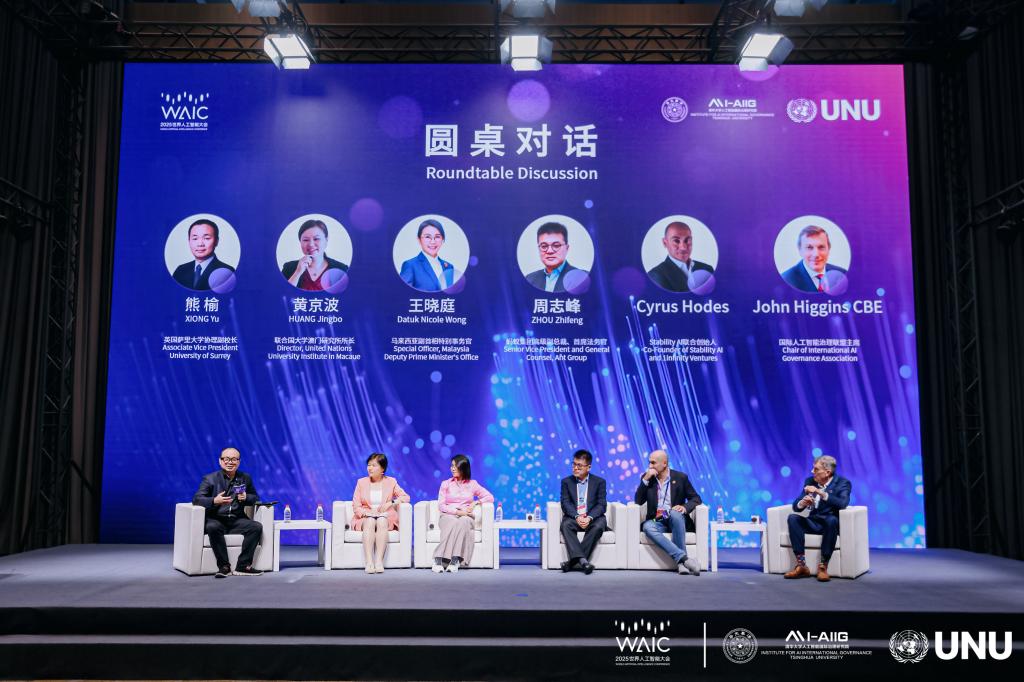
Conclusion
From the UN’s inclusive vision and national regional cooperation to corporate ecological responsibility, ethical boundaries in technology, the coordinating role of international organizations, and philosophical reflections on humans coexisting with this emerging “species,” participants reached a core consensus: AI governance is a complex system requiring global multi-stakeholder participation.
Breaking the fragmented status quo to develop an inclusive, cooperative, and sustainable global governance system is essential to ensuring AI serves humanity as a public good rather than a privilege or threat.
The forum attracted experts, business leaders, and government representatives worldwide, fostering in-depth discussions on AI innovation and governance and promoting deeper global cooperation. Over 500 attendees registered on-site, with nearly half a million livestream viewers on Tsinghua University’s official channels, Tencent Tech, and Sohu Tech. The forum has received widespread attention and high praise domestically and internationally.
